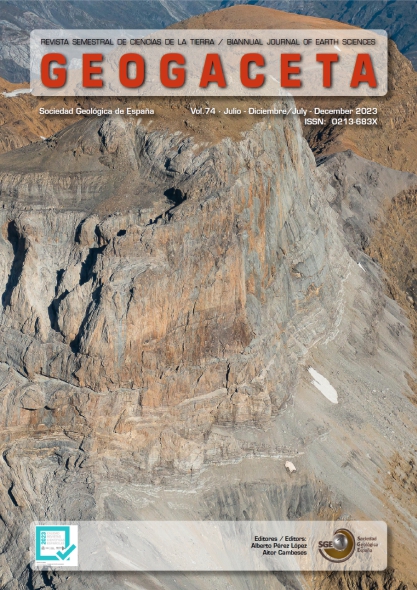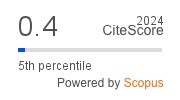Metodología para la evaluación del riesgo de subida del nivel del mar en la zona costera expuesta de Portugal
DOI:
https://doi.org/10.55407/geogaceta98169Palabras clave:
subida del nivel del mar, peligro, inundación costera, erosión costeraResumen
Se espera que los futuros escenarios de subida del nivel del mar en Portugal pongan en riesgo zonas sensibles desde el punto de vista natural y urbano. Esta investigación propone una metodología para la evaluación de las zonas de riesgo de subida del nivel del mar utilizando la evaluación de los componentes permanentes y episódicos como factores importantes para predecir los riesgos de inundación y erosión costera para los escenarios Shared Socioeconomic Pathway 1, 2 y 5, en 2040, 2070 y 2100.
Citas
Antunes, C. (2019). Assessment of Sea Level Rise at West Coast of Portugal Mainland and Its Projection for the 21st Century. Journal of Marine Science and Engineering, 7(3), Artigo 3. https://doi.org/10.3390/jmse7030061
Bon de Sousa, L., Loureiro, C., & Ferreira, O. (2018). Morphological and economic impacts of rising sea levels on cliff-backed platform beaches in southern Portugal. Applied Geography, 99, 31-43. https://doi.org/10.1016/j.apgeog.2018.07.023
Brown, S., Nicholls, R., Woodroffe, C., Hanson, S., Hinkel, J., Kebede, A., Neumann, B., & Vafeidis, A. (2013). Sea-level rise impacts and responses: A global perspective. Faculty of Science, Medicine and Health - Papers: part A, 117-149. https://doi.org/10.1007/978-94-007-5234-4_5
Costa, M., & Esteves, R. (2010). Clima de agitação marítima na costa oeste de Portugal Continental. Proceedings of XI Jornadas Técnicas de Engenharia Naval - O Sector Marítimo Português, 413-426.
Ferreira, Ó., Dias, J.A., & Taborda, R. (2008). Implications of Sea-Level Rise for Continental Portugal. Journal of Coastal Research, 24(2), 317-324. JSTOR. https://doi.org/10.2112/07A-0006.1
Neumann, B., Vafeidis, A. T., Zimmermann, J., & Nicholls, R. J. (2015). Future Coastal Population Growth and Exposure to Sea-Level Rise and Coastal Flooding-A Global Assessment. PLOS ONE, 10(3), e0118571. https://doi.org/10.1371/journal.pone.0118571
Nicholls, R. J., & Cazenave, A. (2010). Sea-Level Rise and Its Impact on Coastal Zones. Science, 328(5985), 1517-1520. https://doi.org/10.1126/science.1185782
Oppenheimer, M., Glavovic, B.C., Hinkel, J., van de Wal, R., Magnan, A.K., Abd-Elgawad, A., Cai, R., Cifuentes-Jara, M., DeConto, R.M., Ghosh, T., Hay, J., Isla, F., Marzeion, B., Meyssignac, B., & Sebesvari, Z. (2019). Sea Level Rise and Implications for Low-Lying Islands, Coasts and Communities. Em IPCC Special Report on the Ocean and Cryosphere in a Changing Climate (pp. 321-445). IPCC.
Ponte Lira, C., Nobre Silva, A., Taborda, R., & Freire de Andrade, C. (2016). Coastline evolution of Portuguese low-lying sandy coast in the last 50 years: An integrated approach. Earth System Science Data, 8(1), 265-278. https://doi.org/10.5194/essd-8-265-2016
Shadrick, J. R., Rood, D. H., Hurst, M. D., Piggott, M. D., Hebditch, B. G., Seal, A. J., & Wilcken, K. M. (2022). Sea-level rise will likely accelerate rock coast cliff retreat rates. Nature Communications, 13(1), Artigo 1. https://doi.org/10.1038/s41467-022-34386-3
Tadesse, M. G., & Wahl, T. (2021). A database of global storm surge reconstructions. Scientific Data, 8(1), Artigo 1. https://doi.org/10.1038/s41597-021-00906-x
Descargas
Publicado
Cómo citar
Número
Sección
Licencia
Derechos de autor 2023 Jorge Trindade, Eusébio Reis, Jorge Rocha, Pedro Pinto Santos, Ricardo Garcia, Sérgio Cruz Oliveira, Andreia Silva, Samuel Pinheiro, jose Cuervas-Mons

Esta obra está bajo una licencia internacional Creative Commons Atribución-NoComercial-CompartirIgual 4.0.
Hasta el año 2023 el autor/a cedía el copyright (“derechos de autor”) a la Sociedad Geológica de España, pero desde el 2024 el/la autor/a conserva los derechos de autor y concede a la Sociedad Geológica de España el derecho de la primera publicación y de manera no exclusiva cede la distribución de cada artículo en todos los soportes actuales o futuros, al mismo tiempo que ceden, también de manera no exclusiva, los derechos comerciales para la distribución de la versión impresa de Geogaceta. Por otra parte, los artículos, a partir del año 2023, están disponibles simultáneamente a su publicación, bajo la licencia Creative Commons CC BY-NC-SA 4.0, que permite copiar, transformar el trabajo, pero si se distribuye transformándolo, el nuevo trabajo debe distribuirse bajo la misma licencia, y nunca con propósitos comerciales, al tiempo que se reconoce la autoría y la publicación original en GEOGACETA, de tal manera que el único rol del copyright es dar a los autores el control sobre la integridad de sus trabajos y el derecho de ser adecuadamente reconocidos y citados.









